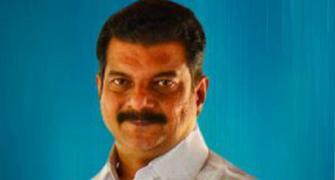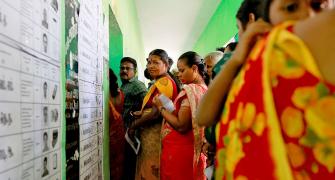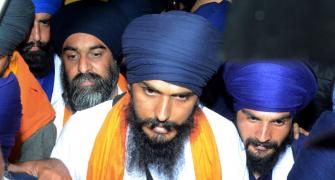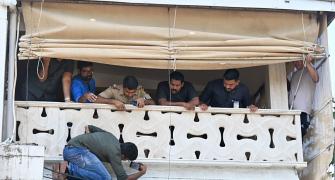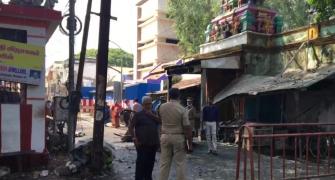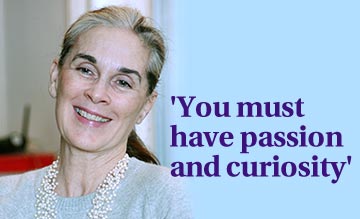
Susanna Moore's One Last Look, a story of conflicting desires and folly of well-meaning people, is set in the Calcutta [now Kolkata] of the first half of the 19th century. Though some critics found the book too ornate, The Washington Post gave it an excellent review. 'How marvelous is a book that educates but does not preach!' wrote Carolyn See. 'One Last Look is a cautionary tale for smart women... and dumb men... but the beauty of the prose and the complexity of the narrative here far outweigh any edifying messages.'
The New York Times recently listed it in its And Bear In Mind section, calling it 'a fine historical and political novel.' Writing earlier in The Times, Michiko Kakutani noted, 'What Ms Moore does so well in this book is what she did so well in her early novels set in Hawaii: she conjures the heat and light and color of this hot, beautiful land, its smells and sensual allure... Ms Moore also chronicles with subtle emotional detail the effect that India -- in both its exotic extravagance and its harrowing poverty -- has on the narrator and her family.'
'With One Last Look,' Kakutani added, 'Ms Moore has worked a satisfying variation on many of her perennial themes and produced a compelling and richly textured story.'
Readers who remember In the Cut, an erotic, tough and psychological crime drama set in New York, will find a very different book in One Last Look. In the Cut is now a much-discussed film, recently screened in movie houses in North America. Moore says there are some common threads between the two novels -- they deal with strong women. And they take a strong look at society around them.
Moore, who lives in New York with her sculptor companion, Fulbright scholar John Newman, has visited India five times. In between writing and traveling, she teaches writing at a shelter home in the city. She spoke to Senior Editor Arthur J Pais recently.
You spent several days working with Mother Teresa's Missionaries of Charity nuns. What was it like?
I could not start working there because I was shocked and horrified. In America, we are so protected from physical ugliness. After the third visit, I started feeling comfortable. I was able to overcome my horror and sadness.
What else struck you most?
They openly welcome anyone who wants to work there. It is not like an American hospital where there is a lot of security.
What are some things you learned there?
I discovered that while working there, it was about the receiver as well as the giver. In many ways it was about me. I realized a lot of good work is about the doer. People go there for many reasons. Their compulsion could come from shame, guilt or some other reason. It is important to recognize this, and to realize it is alright to feel good about it, to enjoy the joy and pleasure one may get out of such work.
Did you think about the life in shelters in America when you were in Calcutta?
I also thought about the people in the shelter I worked for. Though they are so dependent on the state and find it difficult to get a job, they are lucky compared to children in Calcutta. They have many more opportunities in this country. Some of them are obsessed with becoming doctors. Such dreams are less common in Mother Teresa's place though they are not impossible.
What was your inspiration for writing this novel?
I have visited India half a dozen times and I lived in Calcutta for five months four years ago. While I was there, I visited many bookshops. Whenever I travel, I collect maps, books, diaries in towns and cities. In Calcutta, I read many journals, diaries, collections of letters and histories. While reading Up The Country by Emily Eden, who traveled to India in 1836 with her sister Fanny, her nephew, brother George Eden and Lord Auckland, I began to wonder what her life would have been. I suspected she was not telling the whole truth. I didn't know if she even knew the truth herself. Most likely she did not.
That led you to...
I began to think about Calcutta in 1836. What would it have been like for Emily Eden and her younger sister Fanny? That is how I began to write One Last Look. I also began to look at the impact of imperialism and colonialism.
You grew up in Hawaii. Did it help write about India?
We believe in Hawaii that we always look East, though mostly toward China and Japan. Growing up in Hawaii, which is not physically unlike South India, did help me to feel comfortable in India from the start. But I always knew I would be an outsider.
How did that perception help in shaping your book?
I realized early on that it is an utterly different culture. I knew I could only write about it as an outsider, which is why Eleanor was born. To tell the story from a non-Indian perspective.
Who edited your book at Knopf?
Sonny Mehta, who has also edited and published my previous two books, including In the Cut.
What was his initial reaction?
He said he could not have been more surprised. He knew I wanted to write a book set in India but was not prepared for it this time.
Why was that?
My contract was to write a novel of a triangle in an American marriage but when I spent several months in Calcutta, I changed my mind. I did not tell him that though.
What were some of his contributions?
He is always busy. It took him a few days to get to my papers. He is an extremely sophisticated editor.
I was naturally worried about giving my pages to an editor with more than three decades of experience and who happened to be an Indian. His suggestions included expanding a few scenes. He wanted me to include more of the men.
You have started a book reading tour. What are some questions readers ask you?
Many readers, particularly those who have read In the Cut, ask me how I came to write this book which is very different from my previous book. They also ask about Calcutta which to many Americans seems a forbidden place.
What do you tell them about Calcutta?
I tell them what a beautiful place it is and how it has always been the center of intellectual life in India. They look at me and ask, 'Really?'
When are you planning to return to India?
As soon as I can. I have been asking my publishers to send me to India to promote my book.
Which places in India would you like to visit again?
Hampi and Bijapur (in Karnataka) even though they do not have good hotels. I want to see more of the South. And, oh, I would like to revisit Thanjavur. The last time I was there, I took a car and traveled in the countryside discovering temple after temple not mentioned in tourist books. There are so many places I want to visit in Rajasthan and West Bengal. I want to go back to Shanti Niketan. I may teach there for some time. And there is Orissa.
What attracts you to Orissa?
It has many wonderful temples. I know Naveen Patnaik, the chief minister of the state (and Sonny Mehta's brother-in-law; Mehta is married to novelist Gita Mehta, Patnaik's sister). He has many friends abroad but once he became chief minister, no one in the West seems to have seen him. We have been bereft of his company.
Your daughter Lulu is writing a novel. Could you tell us about it?
She is writing a difficult book, about a child of privilege growing up in New York. It follows the child from age 5 to 30.
What writing advice do you give her?
As I tell writing students: You must have passion and curiosity about your subject. I am editing her pages. I know she is a brilliant writer but when I feel she has gone deep, I have to tell her. I do that with my writing too. There are times I feel I have treated something scantily and I then start revising it.
Do you get her to read your work and discuss it?
No. It will be too much of a burden for her.
Photographs: Paresh Gandhi. Design: Dominic Xavier



